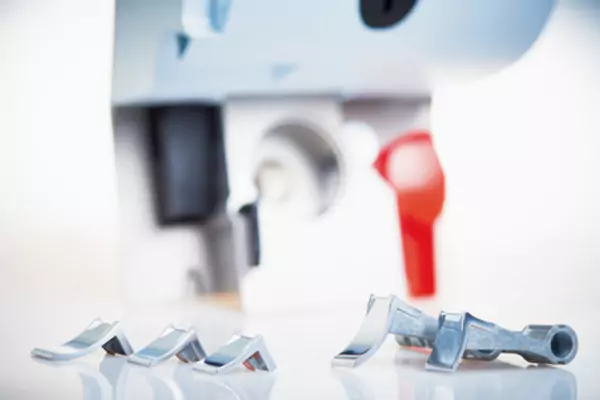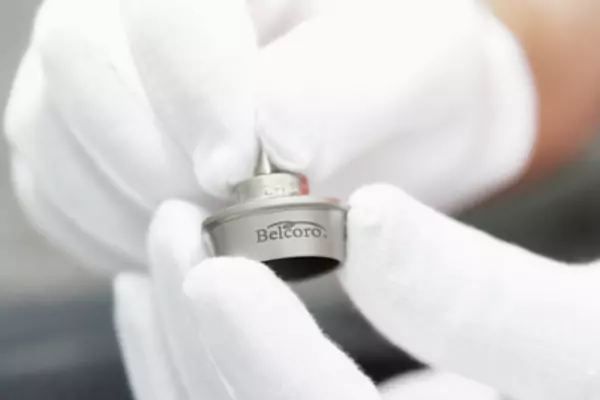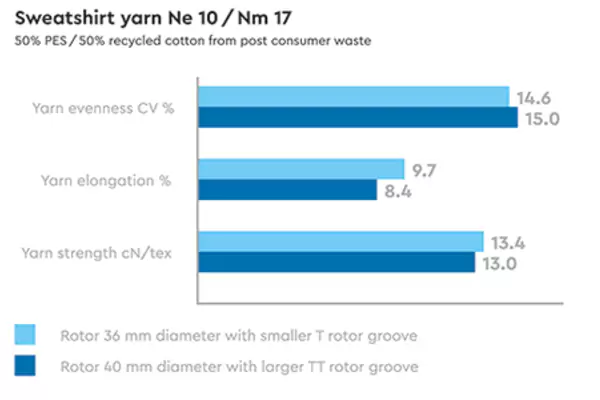Autocoro 11 is perfectly suited for processing recycled fibres, be it comber noil, waste from spinning preparation or rotor spinning, or mechanically recycled fibres from textiles. Thanks to the new features, customers can produce more sustainably with the Autocoro 11 and at the same time save up to 50% on raw material costs.
The variety of recycled fibres and blends is huge, there is no such thing as THE one recycled blend, each one is different. Mechanically recycled fibres, for example, are up to 40% shorter than new fibres, have a high variation in fibre length distribution and contain dust-like fragments.
The rules for spinning are therefore somewhat different from those for using classic new fibres. While, for example, when spinning new raw cotton, the aim is to eliminate short fibres and dust-like fibre fragments in order to achieve maximum rotor speeds, as few yarn breaks as possible plus the best yarn quality values, the aim of sustainable spinning is to lose as little raw material as possible and, ideally, to spin everything into the yarn.
The Autocoro 11 with Recycling Xtreme addresses the diverse requirements and offers an intelligent interplay of possibilities: to produce the best possible yarn from every blend, both in terms of productivity and quality.

Spin box SE 21, the all-rounder for recycled fibres
An important piece in this game is the spin box of the Autocoro 11, the spin box SE 21. It is equipped with dirt-repellent aluminium caps that prevent, for example, static charges from accumulating on the spin box surface in the area of the opening roller housing, which would have to be removed manually.
New fibre beard supports, which are clipped in without tools, adjust the flow conditions in the opening roller housing so that valuable recycled raw material is incorporated into the yarn and not separated out.
Belcoro rotors for Recycling Xtreme
Another move for successful recycling processing is the selection of rotors with a groove shape, rotor coating and diameter tailored to the raw material. There is no universal rotor for recycling, it’s the blend that counts. Blends of recycled polyester with waste from the spinning mill are popular.
Yarns made from these materials are often relatively coarse and are used, for example, for the napped inside of sweatshirts. With such raw materials, the rotor grooves tend to become heavily soiled, the yarn quality can fluctuate and the number of yarn breaks increases. Rotors with a narrow rotor groove, the T-groove, are then a good choice. The T-groove perfectly presses the short fibres into the groove and binds them into the yarn, ensuring good yarn strength.

Further tuning of yarn strength, elongation, uniformity and productivity can be achieved by selecting a slightly smaller rotor, as the smaller diameter further increases fibre integration. For a coarse lining yarn made from recycled fibres, the spin box SE 21 achieved strength increases of 0.4 cN/tex and an elongation increase of more than 1% thanks to a rotor that was only 4 mm smaller.
Rotors with a pure boride coating are well suited for relatively coarse yarns consisting of blends with a high proportion of soiled cotton waste from the spinning mill, for example from the roving frame.
The blends contain relatively many vegetable components from the cotton, such as trash, short fibre fragments and also dust particles. The smooth boride coating is particularly robust against the abrasive properties of such fibres, and the lack of diamond coating on these rotors makes the rotors smoother, which reduces unwanted deposits in the rotor groove and makes cleaning the rotors easier.
The longer fibres in such blends, which are particularly relevant for the quality of the yarn, are effectively bound in the clean rotor groove. Yarn formation is precisely controlled and not subject to fluctuations due to partial deposits in the rotor groove.

Sustainable textiles made from finer yarns, such as T-shirts, are also popular. They often consist of blends of chemically recycled polyester with high-quality raw cotton or mechanically recycled cotton from the pre-consumer sector.
The proportion of fibre fragments and vegetable particles is significantly lower in these mixtures. In the case of mechanically recycled cotton, they have already been completely eliminated in the preceding spinning process. Rotors with the Saurer 3D coating, a boride diamond coating, are the ideal choice for these yarns.
The diamond particles improve the stretching of the fibres in the yarn that have been shortened during the recycling process. Coupled with a significantly smaller rotor diameter of the boride diamond-coated rotors, the yarns achieve a significant increase in yarn strength, elongation and yarn evenness as well as in productivity thanks to a higher rotor speed.
Recycled raw materials and the Autocoro already make a good team. The majority of Autocoro spinning mills process sustainable raw materials, and the trend is rising. Recycling Xtreme, together with an optimally selected Belcoro spinning agent combination, now opens up even more opportunities for companies to skilfully combine economic efficiency and sustainability aspects.



















